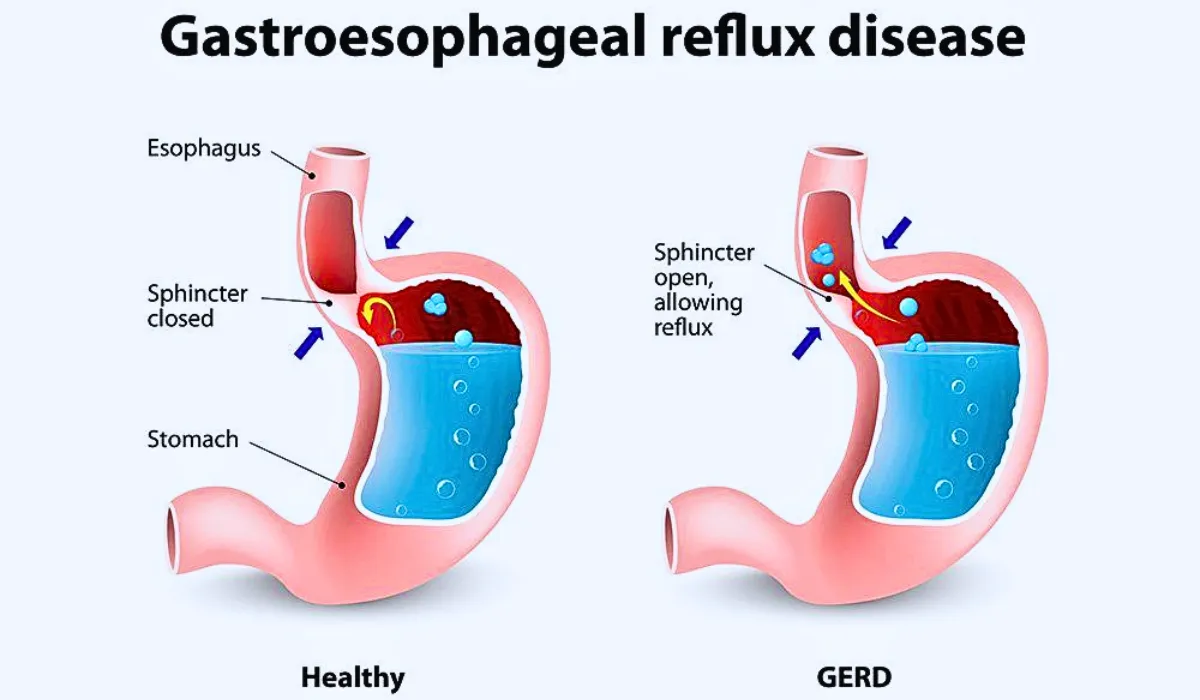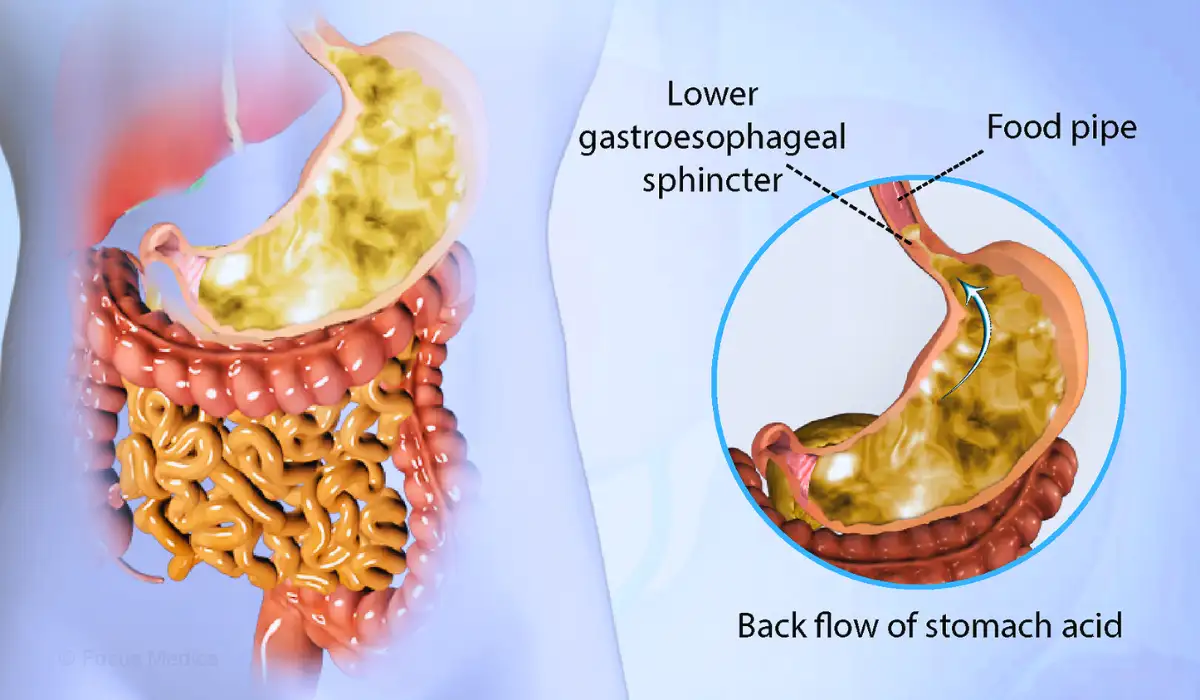We speak of GERD when gastroesophageal reflux is pathological with symptoms that cause damage to the esophagus. GERD can lead to complications such as oesophagitis or inflammation of the esophagus. Several causes can explain this reflux, such as anatomical causes. The treatments prescribed are medications that reduce or suppress acid secretion or promote emptying of the stomach, sometimes surgery is considered.
Gastroesophageal reflux, what is it?
Gastroesophageal reflux is the reflux (rising) of stomach content into the esophagus due to malfunction of the cardia which closes the top of the stomach and normally prevents this type of reflux. Almost one in ten people have daily symptoms of gastroesophageal reflux disease (GERD). In adults, we distinguish between intermittent physiological gastroesophageal reflux, which does not cause complications, and gastroesophageal reflux which persists over time ( stomach acid reflux is significant, very frequent, and prolonged)

Gastroesophageal reflux in infants
Many babies suffer from GERD before the age of 3 months. The cause of this very painful reflux is the immaturity of the esophageal sphincter, this phenomenon results in regurgitation ( backing up of stomach content into the esophagus). Most often it fades when the child begins to sit or walk. Sometimes, reflux leads to Inflammation of the lining of the esophagus, also called esophagitis. This caused various disturbing Symptoms such as regurgitation with traces of blood, crying, weight loss, etc. A medical assessment and drug treatment are necessary.
The Causes of reflux
These are most often anatomical causes
that arise from poor functioning of the lower esophageal sphincter,hiatal hernia
Abdominal hypertension (that results mainly from obese people, or in cases of pregnancy). Other factors that can cause esophageal reflux are patients with a previous history of gastric surgery, lack of resistance of the esophageal mucosa, and
abnormality of gastric juice. Also, the use or intake of some medications and toxicants (anticholinergic, beta blocker, nicotine, alcohol, caffeine, spices, etc.) posits other forms of triggers for the development of esophageal reflux.
Symptoms of gastroesophageal reflux.
Any individual suffering from medical complications of esophageal reflux may present the following as signs indicating the clinical severity of the condition. Often, patients complain of burning behind the sternum ( pyrosis) after a meal, this pain also appears when ingesting very cold or very hot drinks. In some cases, it can present as a form of acid regurgitation ( sumption of stomach content), or a nocturnal reflux cough indicating gastroesophageal reflux during sleep or feeling of pain sensation, burning in the upper abdomen. Other Symptoms may appear in the form of dysphagia ( difficulty in swallowing, more or less bleeding may be experienced in stools and vomits. This condition sometimes may manifest in combination with other medical conditions such as pulmonary and ENT medical complications (asthma, sleep disorder, chronic cough, pharyngitis, laryngitis, etc.)
GERD: causes of increased Symptoms
All signs of reflux are increased by action that increases pressure in the abdominal postural syndrome like:
- Lean forward to tie your shoe
- Lie on your stomach or side
- Make an effort to cough or defecate
- After abundant meals rich in fat and alcohol
- Recurrent pharyngitis or laryngitis attack if asthmatic dyspnea or true asthma, recurrent bronchitis, or pneumonia are possible
- Dysphagia (difficulty swallowing) may indicate peptic esophagitis, an inflammatory lesion in the lining of the esophagus caused by the corrosive action of acidic gastric secretion.
Diagnosis of reflux disease
Questioning is sometimes enough to diagnose gastroesophageal reflux, particularly if the patient is young; the gold standard remains endoscopy which allows the esophagus to be visualized and esophagitis or lesion to be diagnosed.
Also Read: Best Diet Plans for Weight Loss
Additional examination
- Ph measurement which allows you to measure the acidity level in the esophagus
- The esogadtroduodenal transit, a medical imaging test allowing the image test allowing the transit to be visualized can be useful, but little useful to this day.
- An x-ray in particular to access the size and type of hiatal hernia
Complications of gastroesophageal reflux
It is especially peptic esophagitis that makes medical or surgical treatment essential, in the absence of which the patient risks presenting a stenosis of the lower esophagus with dysphagia (difficulty swallowing)

Treatment of GERD
- Essential hygiene and dietary advice in case of GERD.
- You need to Lose weight if you are overweight
- Split up your food intake and eat 5 or 6 small, light meals rather too large meals
- Avoid carbonated drink
- Avoid irritating food, spices, coffee, alcohol, salad dressing, acidic fruits
- Avoid slow-digesting foods such as fatty dishes
- Avoid tobacco
- Eat the evening meal well before going to bed and do not take a nap after lunch
- Do not wear girdles, corsets, or belts that are too tight
- Raise the head of the bed
- Limit forward-leaning posture as much as possible, particularly in gardening, it is better to use long sleeves, squat, or kneel
Medications
Gastric antisecretory drugs: proton pump inhibitors (Omeprazole For example) are effective, but recurrence is possible
Digestive motility stimulants (cisapride for example) possibly combined with antisecretory drugs can provide relief to patients
Mucosa dressing ( antacid) alumina gel, polysilane gels, actapulgite, Gelox, Maalox, gaviscon, etc provide help.
Surgery addresses medical treatment failure
Reduction of a possible hiatal hernia (very rarely offered) and an antireflux assembly (fundoplication) are proposed
How to manage GERD in adults
The management of GERD in adult depend mainly on their intensity and frequency
Occasional GERD: a change in habit particularly in terms of hygiene and diet, is most of the time enough to make them decrease or disappear
GERD is more frequent: if the Symptoms persist even after adaptation of hygiene and diet, you’re over 50 years old, present other Symptoms ( painful swallowing, traces of blood, etc), or suspect a link with a treatment you are taking, you should consult immediately
painful GERD: if reflux causes permanent pain behind the breastbone or difficulty swallowing, you should see a doctor within a day
How to calm GERD
To relieve the Symptoms of GERD there are medicinal treatments that must be accompanied by healthy and dietary measures, the treatment indicated may be:
Taking a digestive dressing before each meal to line the esophagus and prevent burns, this treatment helps heal lesions on the mucous membrane.
Antacid and alginate are to be taken occasionally and by prescription after each meal, to calm the Symptom
Proton pump inhibitor on prescription, to treat Inflammation of the esophagus and promote healing
Read More: How do I improve my lung health?
Conclusion
Reflux and burn often occur when lying down or leaning forward, reflux can sometimes lead to vomiting. Less often GERD can cause a cough, which is rather dry and sometimes chronic, or even chest pain. Gastric reflux can also be the cause of symptoms such as sore throat, reminiscent of laryngitis or pharyngitis. Good to know, that pain in the chest caused by GERD can be reminiscent of angina pectoris, so if it is oppressive in the middle of the chest and is accompanied by a great Fatigue, dizziness, or shortness of breath you must consult quickly.
References
1. El-Serag HB, Sweet S, Winchester CC, Dent J. Update on the epidemiology of gastro-oesophageal reflux disease: a systematic review. Gut. 2014;63:871–880. [PMC free article] [PubMed]
2. Locke GR, 3rd, Talley NJ, Fett SL, Zinsmeister AR, Melton LJ., 3rd Prevalence and clinical spectrum of gastroesophageal reflux: a population-based study in Olmsted County, Minnesota. Gastroenterology. 1997;112:1448–1456. [PubMed] [Google Scholar]